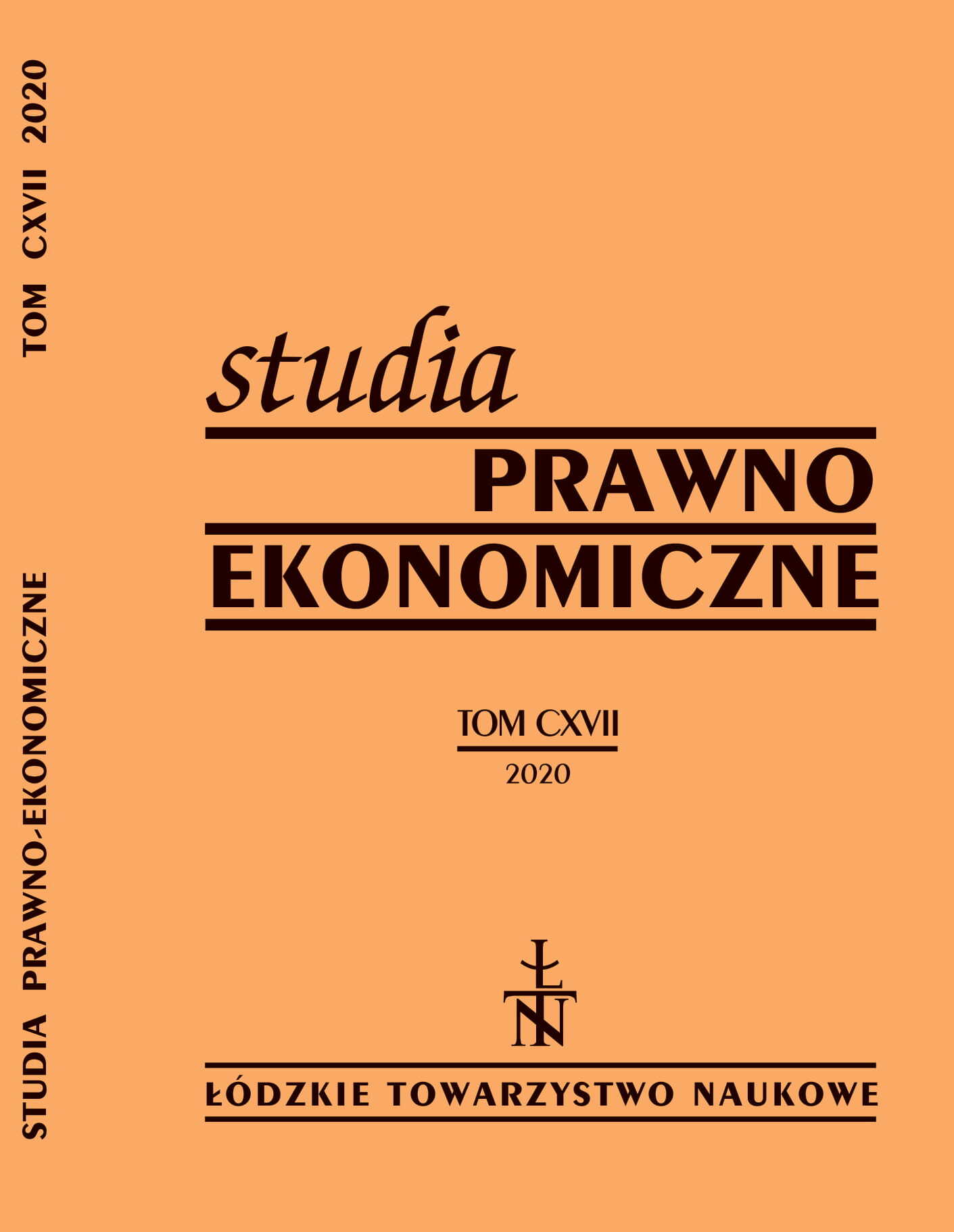Genesis, objectives and aims of the “MLI” convention
DOI:
https://doi.org/10.26485/SPE/2020/117/2Keywords:
“MLI” Convention, international tax law, erosion of the tax base, unfair tax competitionAbstract
Background: Multilateral tax agreements are very rarely concluded, therefore the Author of the article has made the genesis, assumptions, and objectives of the multilateral convention implementing measures of the treaty tax law aimed at preventing erosion of the tax base and transfer of profits (“MLI” Convention) the subject of his research.
Research purpose: The research aim of the study is to synthesize the sequence of events contributing to the creation of the “MLI”, to present the assumptions that formed the basis for its adoption, and to indicate the objectives of the multilateral convention. The analysis of these three areas has led to the conclusion that the ratification of the “MLI” Convention is a “milestone” in the process of eliminating harmful tax practices by international operators.
Methods: During the analysis of the subject, research methods characteristic for legal sciences were used. The dogmatic-legal method consisting in the analysis of the provisions of the normative act, the analysis of the literature on the subject and documents and studies on international taxation proved to be helpful.
Conclusions: The analysis of the genesis, assumptions, and objectives of the “MLI” Convention leads the author to draw the following conclusions. The “MLI” Convention is an extremely important instrument of modern international tax law and represents a turning point in the history of tax avoidance treaties.
Downloads
References
Conclusions of the Ecofin Council Meeting on 1 December 1997 concerning taxation policy, Official Journal of the European Communities, 6.01.1998, C2/1.
G20 Leaders Declaration, Los Cabos on 18–19 June 2012.
Konwencja wielostronna implementująca środki traktatowego prawa podatkowego mające na celu zapobieganie erozji podstawy opodatkowania i przenoszeniu zysku, sporządzona w Pa¬ryżu dnia 24 listopada 2016 r. Warszawa, dnia 17 lipca 2018 r. (Dz.U., poz. 1369).
Opinia do ustawy o ratyfikacji Konwencji wielostronnej implementującej środki traktatowego prawa podatkowego mające na celu zapobieganie erozji podstawy opodatkowania i przeno¬szeniu zysku, sporządzonej w Paryżu dnia 24 listopada 2016 r. (druk nr 606).
Ustawa z dnia 14 kwietnia 2000 r. o umowach międzynarodowych (Dz.U. z 2000 r., nr 39, poz. 443).
Ustawa z dnia 14 lutego 2003 r. o rachunkowości (Dz.U. z 2003 r., nr 49, poz. 408).
Ustawa z dnia 29 września 2017 r. o ratyfikacji Konwencji wielostronnej implementującej środki traktatowego prawa podatkowego mające na celu zapobieganie erozji podstawy opodatko¬wania i przenoszeniu zysku, sporządzonej w Paryżu dnia 24 listopada 2016 r. (Dz.U. z dnia 14 listopada 2017 r., poz. 2104).
Action Plan on Base Erosion and Profit Shifting, OECD 2013.
Addressing the Tax Challenges of the Digital Economy, Action 1 Final Report, OECD 2015.
Aligning Transfer Pricing Outcomes with Value Creation, Actions 8–10, Final Reports, OECD 2015.
Brauner Y., Treaties in the Aftermath of BEPS, 41 Brook. J. Int’l L. 973, University of Florida Levin College of Law UF Law Scholarship Repository, 2016.
Countering Harmful Tax Practices More Effectively, Taking into Account Transparency and Sub¬stance, Action 5, Final Report, OECD 2015.
Designing Effective Controlled Foreign Company Rules, Action 3, Final Report, OECD 2015.
Developing a Multilateral Instrument to Modify Bilateral Tax Treaties, Action 15 Final Report, OECD 2015.
Gajewski D.J., Regulacje z zakresu międzynarodowego prawa podatkowego a wdrożenie działań BEPS, Studia BAS 2018/2, s. 113–138.
Harmful tax competition An Emerging Global Issue, OECD 1998.
Hongler P., Justice in International Tax Law. A Normative Review of the International Tax Re¬gime, IBFD 2019.
Jamroży M., Metody unikania podwójnego opodatkowania w świetle wielostronnej konwencji implementującej środki traktatowego prawa podatkowego, Studia Prawno-Ekonomiczne 2018/CVII, s. 11–31.
Jamroży M. (red.), Opodatkowanie dochodów transgranicznych, Wydawnictwo Wolters Kluwer, Warszawa 2016.
Jóźwiak E., Herman P., Transfer Pricing and Selected Problems Related to Their Implementa¬tion, Studia Iuridica Lublinensia 2018/XXVII/2, s. 53–64.
Kuźniacki B., Opodatkowanie zagranicznych spółek kontrolowanych (CFC). Konieczność refor¬my, Wydawnictwo Wolters Kluwer, Warszawa 2017.
Lang M., Pistone P., Rust A., Schuch J., Staringer C. (red.), The OECD Multilateral Instrument for Tax Treaties: Analysis and Effects, Wolters Kluwer 2018.
Limiting Base Erosion Involving Interest Deductions and Other Financial Payments, Action 4, OECD 2016 Update.
Lyons S.M. (red.), Międzynarodowy słownik podatkowy, Polskie Wydawnictwo Ekonomiczne, Warszawa 1997.
Mandatory Disclosure Rules, Action 12, Final Report, OECD 2015.
Mączyński D., The BEPS Influence on Tax Information Exchange, Studia Iuridica Lublinensia 2018/XXVII/2, s. 127–141.
Mączyński D., Międzynarodowa współpraca w sprawach podatkowych, Wydawnictwo Lexi¬sNexis, Warszawa 2009.
Measuring and Monitoring BEPS, Action 11, Final Report, OECD 2015.
Neutralising the Effects of Hybrid Mismatch Arrangements, Action 2 Final Report, OECD 2015.
Preventing the Artificial Avoidance of Permanent Establishment Status, Action 7, Final Report, OECD 2015.
Preventing the Granting of Treaty Benefits in Inappropriate Circumstances, Action 6, Final Re¬port, OECD 2015.
Raińczuk M., Leconte M., Konwencja Wielostronna – wpływ na umowy o unikaniu podwójnego opodatkowania zawarte przez Polskę, Przegląd Podatkowy 2018/1, s. 19–25.
Transfer Pricing Documentation and Country-by-Country Reporting, Action 13, Final Report, OECD 2015.
http://www.g20.utoronto.ca/2012/2012-0619-loscabos.pdf; stan na 14.01.2020 r.



